Top tips to enjoy your outdoor space more sustainably
It can be difficult to know where to start when it comes to making your outdoor space more sustainable. To get you started, we’ve pulled together some top tips on creating a sustainable garden to help you tackle climate change and the climate crisis.


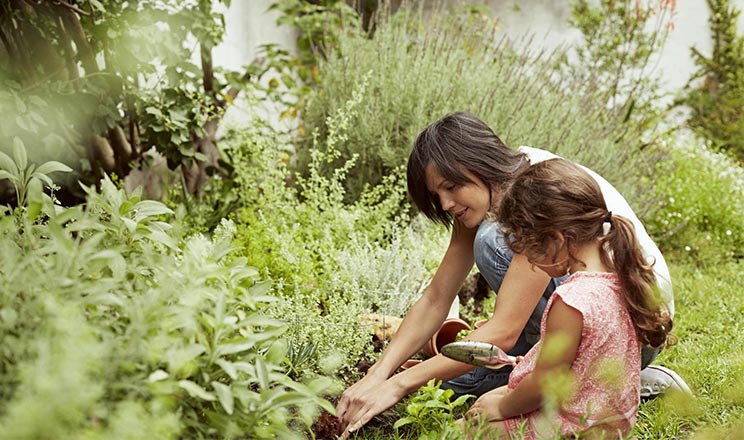
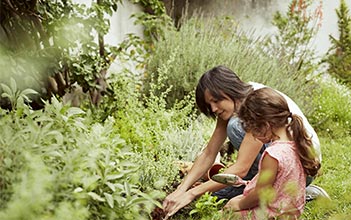
Now that summer is officially here, we’ll all be hoping to enjoy sunny days and evenings outside. Whether you have a garden, balcony or even just a windowsill, there are things you can do to make your outdoor space more sustainable this summer.
Read on to discover our top tips on how to create a sustainable garden, whatever your outdoor space is like.
1. ‘Bee’ friendly with your flowers
The plants and flowers in your garden can help make your outdoor space a calm and relaxing place to be – but they also play a vital role in supporting the local wildlife.

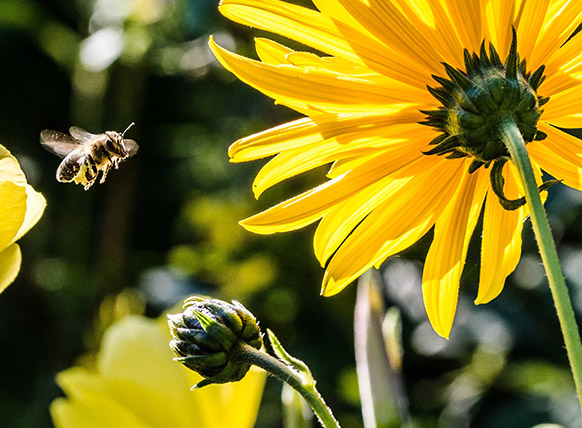
Bees are vital to the Earth’s ecosystem but unfortunately, they have been in decline over recent years1. However, it’s easy to do your bit to help these insects. For example, when you’re choosing flowers for your garden or windowsill, opt for bee friendly flowers such as lavender, dahlias, snowdrops and daffodils2.
Why not go a step further and consider a bee or bug hotel? You’ll help to reduce the decreasing insect population and kids will love the hands-on learning approach.
2. Grow your own
Growing your own fruit, vegetables or herbs is a great way to make your outdoor space more sustainable by reducing the carbon emissions associated with your food3.
The best part is you don’t need a lot of space to grow your own and you can even do it on your windowsill – just make sure there’s enough sunlight for your plants to grow. If you want or need more space to grow your own, consider an allotment.
When it comes to planting or sowing your seeds, choose a peat-free compost rather than non-sustainable peat compost – sales of which will be banned from next year4. And you can always make your own compost, using your food and garden waste to make a compost heap in your garden.

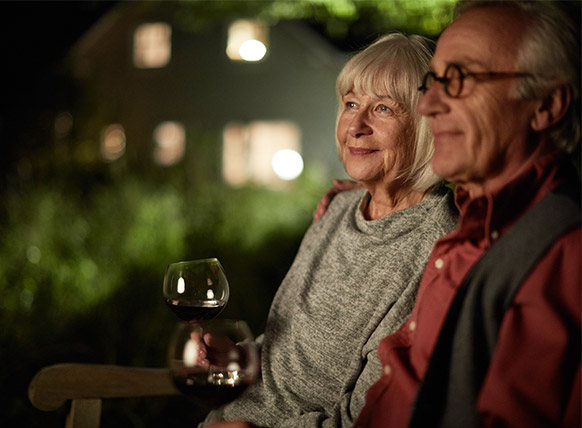
3. Make the most of the sun’s energy
Who doesn’t want to make the most of the summer weather by spending those long, summer evenings outside? But if you’re still enjoying your garden once the sun has gone down, you’re likely to need some lighting.
Rather than choosing standard electric lights that will add to your energy use, why not consider solar powered lights? These lights take energy from the sun during the day and use it to light your garden in the evening – saving you both energy and money. Just make sure to place them in the parts of your garden that get the most sun during the day.
If you do still prefer electric lights, choose energy efficient LED light bulbs to help save you energy when lighting your garden.
But that’s not the only way solar power can help. Think about installing solar panels on your roof to use the sun’s energy to power your home appliances – everything from the kettle and TV to the lawnmower.
4. Rainwater collection
Watering your plants is essential during the warmer summer months if you want them to flourish – but you don’t have to turn the tap on each time. Harvesting rainwater to water your plants and flowers is easier than you might think.
At its most basic level, you can leave a bucket outside to catch and store the rain. But you can also install systems, such as a water butt, to collect the water from your gutters too.
5. Plan an eco-friendly BBQ
There are many different types of barbecues to choose from so it could be tricky to know what the most eco-friendly option is.
Whilst charcoal barbecues are a popular choice, burning coal releases harmful pollutants into the atmosphere5 which contributes to local air pollution levels. But if you can’t resist the true smoky taste of a charcoal barbecue, make sure the charcoal you buy is sourced sustainably and is carbon neutral.

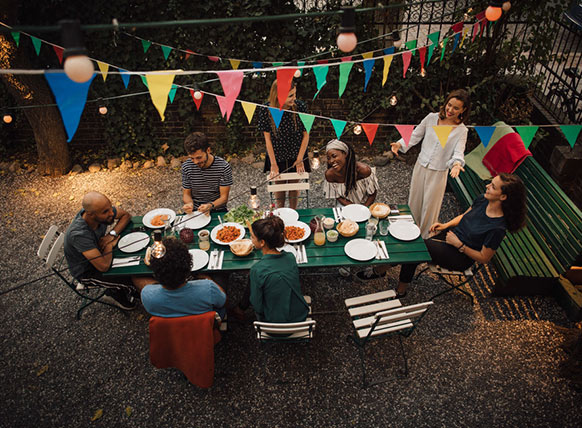
Avoid using disposable barbecues – not only are they unkind to the environment but they have been known to accidentally start fires6. Instead consider an electric barbecue which you can power using your normal electricity supply. Plus, it’s even better if your home's power is backed by 100% renewable electricity, which you receive as standard as an E.ON Next customer7.
When it comes to serving your BBQ food, swap the single use paper plates and plastic cutlery for reusable cutlery – either from your kitchen drawer or a bamboo set for on-the-go dinners. It might mean you have a bit more washing up to do, but the planet will thank you.
6. Plant a tree
If you have the space, trees can bring many benefits to your garden and the local area. Not only do trees offer a habitat and food to many birds and insects, but they also help to remove polluting carbon from the atmosphere and reduce local air pollution8.

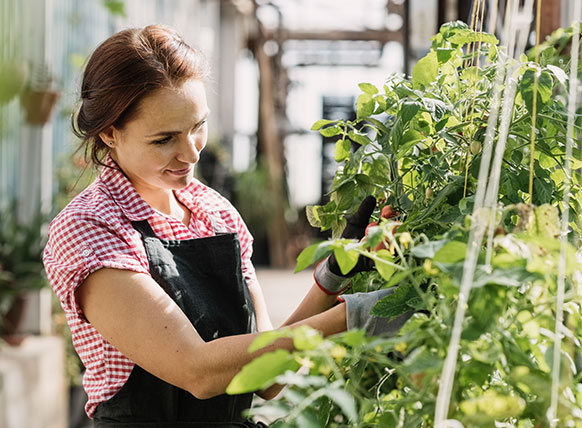
7. Avoid single-use plastic
We all have our reusable water bottle and coffee cup to cut down on plastic waste, but did you know it can extend to gardening too?
Where possible, choose plants that come in recyclable pots and products that come in paper, rather than plastic bags. You can also buy garden supplies that come in reusable bags too.
8. Build a wildlife corridor
Wildlife corridors help creatures go from one area to another, while avoiding human barriers such as fences or busy roads. Many modern gardens aren’t designed for local wildlife and can have a detrimental effect on them.
Wondering how do I build a wildlife corridor? You can create a wildlife corridor in your garden by choosing climbing plants and creating small gaps in adjoining fences.
And if you hate mowing the lawn, a wildlife corridor means that you don’t have to. Instead turn some of your lawn into a wildlife meadow to provide space for bugs, bats, amphibians, creepy-crawlies and small mammals to come and go (and even feed).
9. Consider other ways to tackle the climate crisis
We believe it’s time we all take climate action and taking the small steps within your outdoor space is a great way to kick start your sustainability journey – and may make you look at the other areas in your home where you could lower your carbon footprint. If you want to know how to create a more sustainable home, we have a blog for that too.
1. The Woodland Trust: Why are bees important? And how you can help them
2. Gardener’s World: How to make a bee friendly garden
3. Gardener’s World: How to reduce your carbon footprint in the garden
4. gov.uk: Sale of horticultural peat to be banned in move to protect England’s precious peatlands
5. The Huffington Post: This Is What Your Barbecue Is Doing To The Environment
6. The Guardian: Disposable barbecues banned in parts of Hampshire and Dorset
7. Electricity backed by 100% renewable sources. E.ON's renewable generation assets, agreements with UK wind generators and the purchase of renewable electricity certificates. The electricity supplied to your home comes from the National Grid. eonenergy.com/renewable
8. The Royal Parks: Why are trees so important?